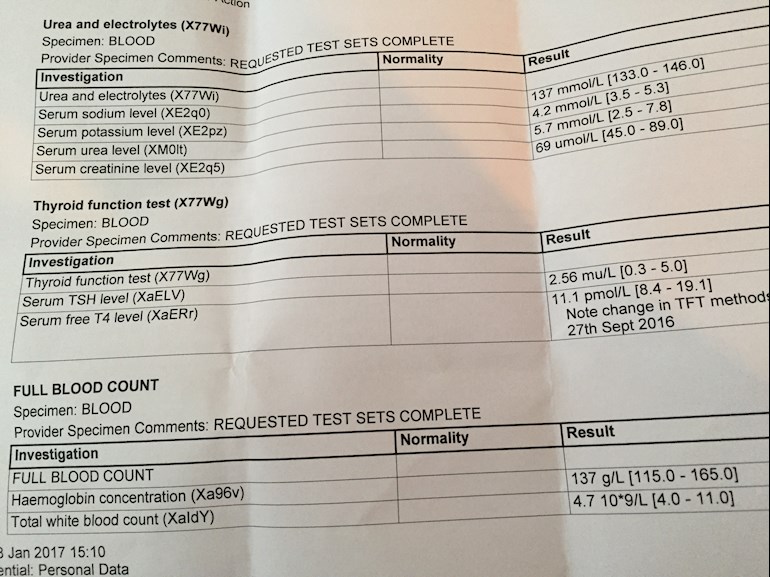Could anyone help me with my results please, still having symptoms of tiredness, lack of sleep sore tongue, weight gain which I cannot lose and (sorry) a very itchy down below 🙊 I have got gluten free since 1st Jan this year and bloods taken on the 16th, my doctor feels the 25mg of Levo is fine, I beg to differ! Any replies I am thankful for.
Results: Could anyone help me with my results... - Thyroid UK
Results

Results #2 on next post
Bizzilizzi71 Well, your doctor belongs in the idiot cupboard along with a lot of others mentioned on here recently.
The aim of a treated hypo patient is for TSH to be 1 or below or wherever it is needed for FT4 and FT3 to be in the upper part of their reference ranges, if that is where you feel well.
Dr Toft, past president of the British Thyroid Association and leading endocrinologist, wrote this in a Pulse Online magazine article:
"The appropriate dose of levothyroxine is that which restores euthyroidism and serum TSH to the lower part of the reference range - 0.2-0.5mU/l.
In this case, free thyroxine is likely to be in the upper part of its reference range or even slightly elevated – 18-22pmol/l. Most patients will feel well in that circumstance.
But some need a higher dose of levothyroxine to suppress serum TSH and then the serum-free T4 concentration will be elevated at around 24-28pmol/l.
This 'exogenous subclinical hyperthyroidism' is not dangerous as long as serum T3 is unequivocally normal – that is, serum total around T3 1.7nmol/l (reference range 1.0-2.2nmol/l)."
If you email louise.roberts@thyroiduk.org.uk she will let you have a copy of the article which you can print out and show your GP or stuff it up any orifice of your choice, whichever is your preference for what he deserves!
(Oh dear, too many threads with stupid doctor comments about poor results not being acted upon, and doctors not really knowing what they are doing, have really got to me  )
)
You need an immediate increase in your Levo of 25mcg, followed 6-8 weeks later by a new test and another dose increase if necessary, followed again 6-8 weeks later with another test, etc, until you feel well and your symptoms have abated.
Thank you so much for your prompt reply, I'm sorry to be so vague, but are you saying my results are not within normal range? I'm wondering if any point to hashimotos?
They are within the normal range, yes, and that is why your GP is not increasing your Levo. They think anywhere in the range is normal and you no longer have a problem with your thyroid so it must be something else. Depression is a good one, I believe they get a bonus for diagnosing that and prescribing anti-depressants, so they like to label as many people as possible with it.
You need thyroid antibodies testing to see if you have Hashimoto's and I can't see them on there or your other thread with the other results.
TPO - thyroid peroxidase is the one the NHS will do
TG - thyroglobulin the NHS don't do, but we can have negative TPO and positive TG and therefore autoimmune thyroid disease. Most members get a private test if they can't get everything done through their GP.
When doctors take the initial blood tests for thyroid hormones to see if we have a dysfunction, they have been told (in the UK ) not to diagnose someone until the TSH is 10 but in other parts of the world they prescribe if the TSH is 3+. Therefore, modern Endos/doctors in the UK are assuming that if we are at the top of the UK range i.e. 5 that we don't have a thyroid disease forgetting that if the patient has already been diagnosed and is on thyroid hormone replacements we should not now be 'in range' but the bottom of the TSH range or lower (i.e. cancer patients have to have a suppressed TSH).
Why is that, that the patient still complains of symptoms which doctors ignore completely in favour of the TSH from the pituitary gland. They are poorly trained in endocrinology.
Excerpt:
This was backed up by research done by the National Academy of Clinical Biochemistry, part of the Academy of the American Association for Clinical Chemistry (AACC), and presented in their Laboratory Medicine Practice Guidelines for the Diagnosis and Monitoring of Thyroid Disease. Late in 2002, this group reported that: "In the future, it is likely that the upper limit of the serum TSH euthyroid reference range will be reduced to 2.5 mIU/L because more than 95% of rigorously screened normal euthyroid volunteers have serum TSH values between 0.4 and 2.5 mIU/L."
and
Implications for Patients
It's now nearly more than decade since the experts recommended this new normal range, doctors have changed their positions yet again, and the guidelines are still in flux. Some doctors use the new range for diagnosis and therapeutic management -- others refuse to consider anything unless it's marked "High" or "Low" on laboratory reports. And laboratories continue to use the older reference ranges for the TSH test.
In the meantime, patients can seek out those doctors who stay up on the research and leave behind those doctors who stick their heads in the sand and refuse to recognize millions of undiagnosed, undertreated people with hypothyroidism. (my highlighting)
More Information on the Controversy
verywell.com/thyroid-testin...
It's well seen how backwards is the UK doctors and the BTA.